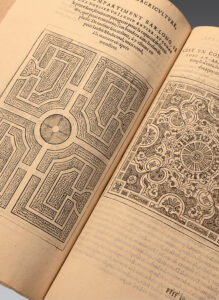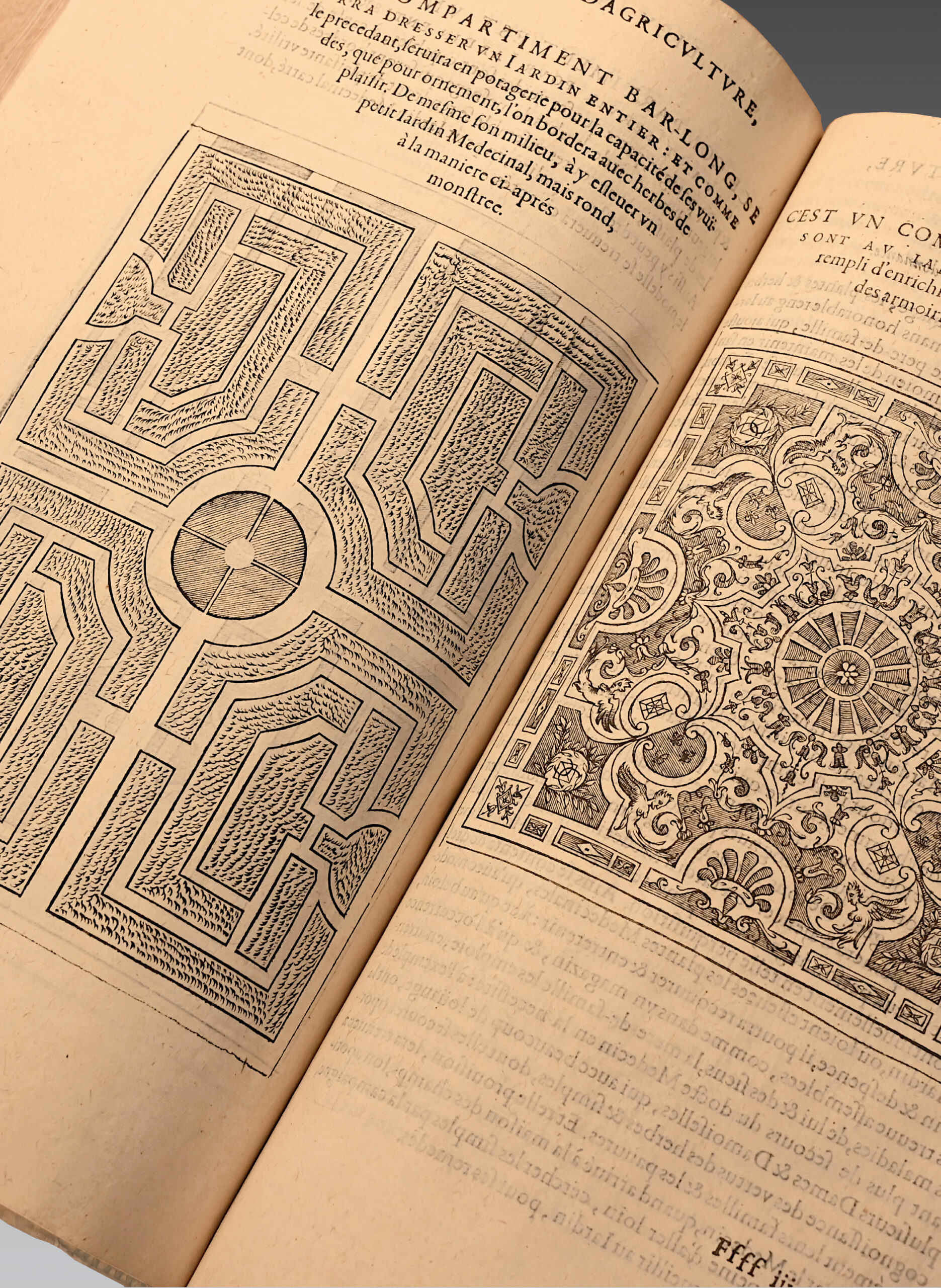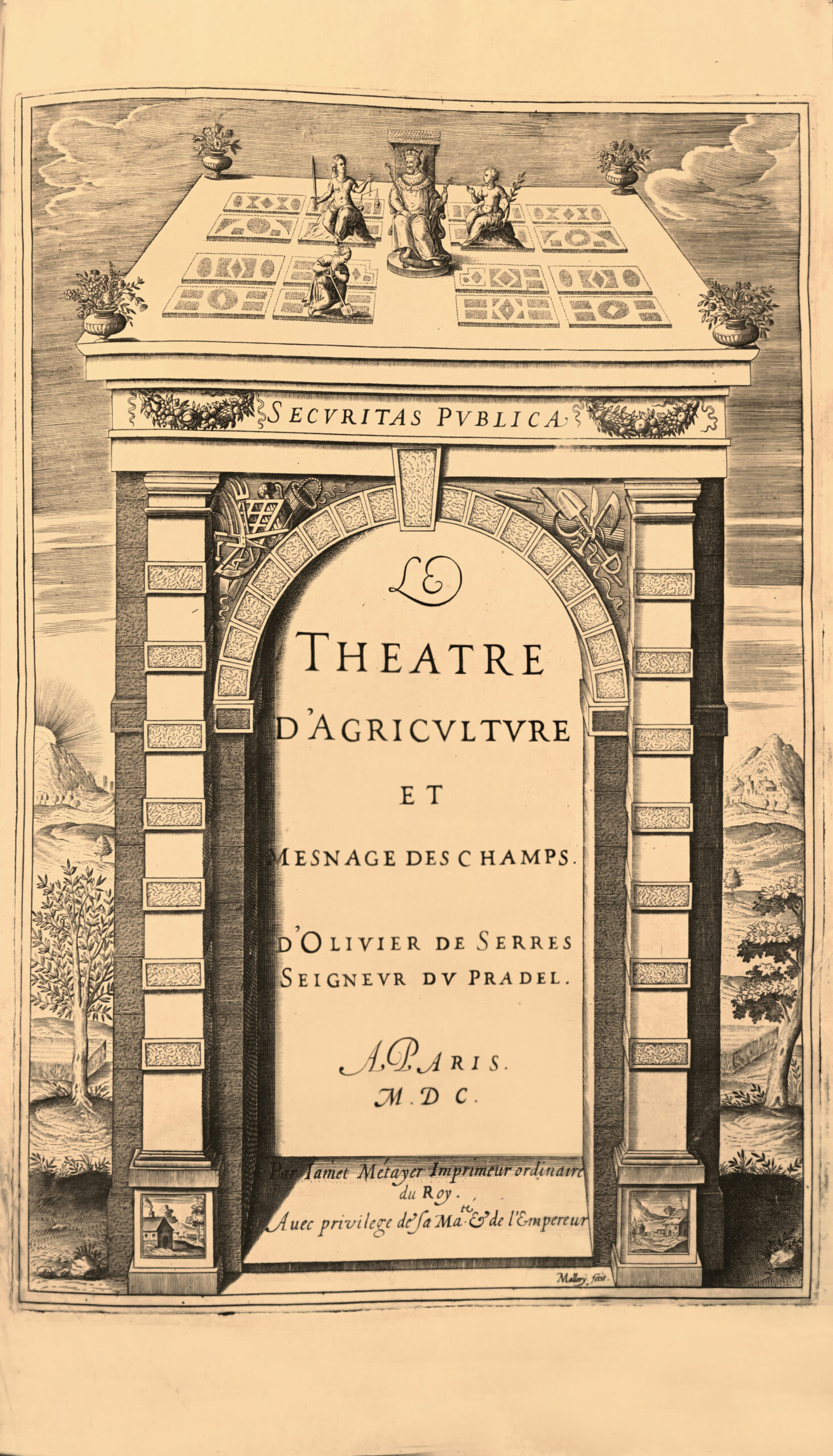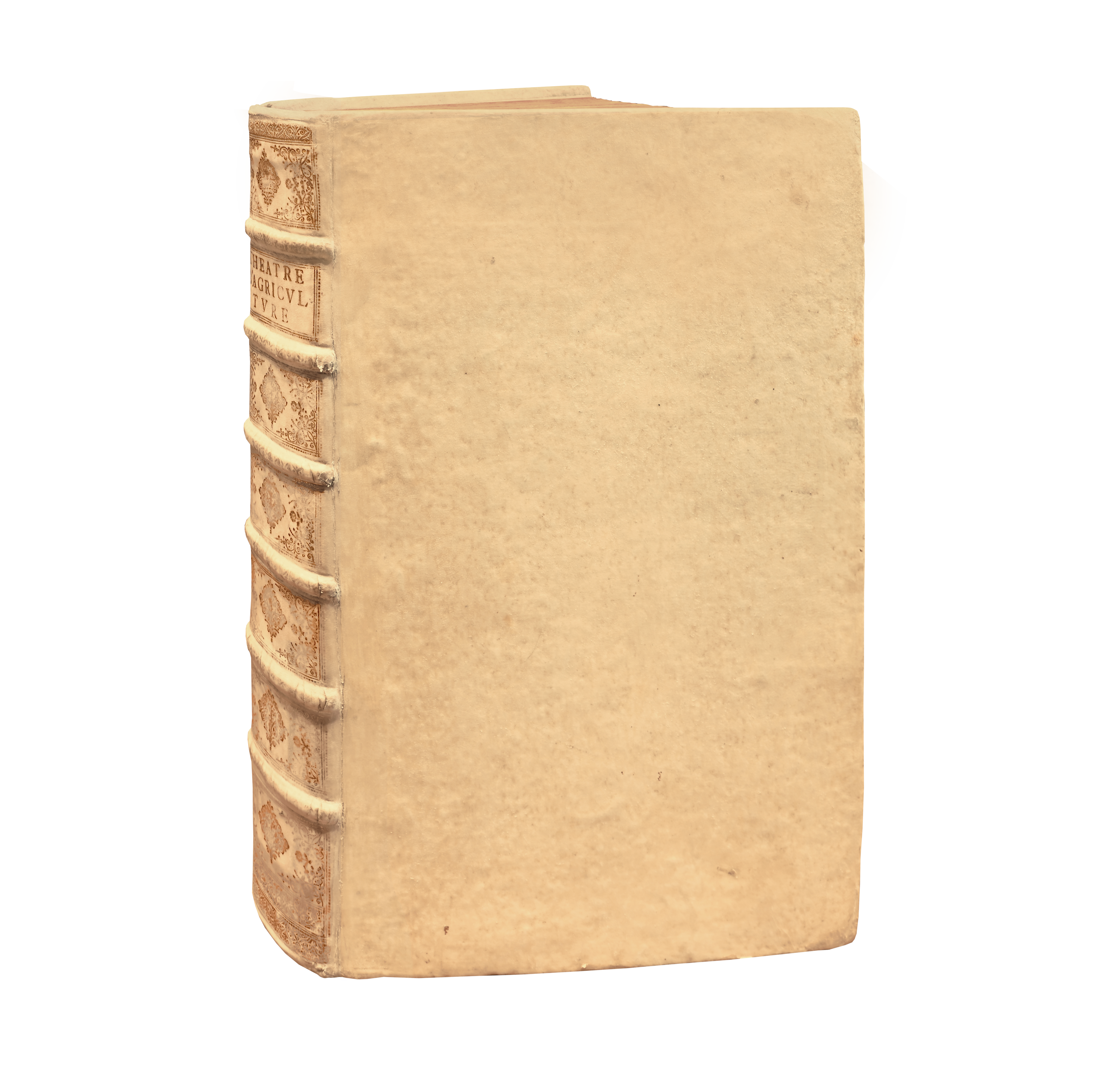Paris, Iamet Metayer 1600. Imprimeur ordinaire du Roi Henri IV.
Folio of (8) ll. including 1 engraved frontispiece, 1004 pp. and (10) ll. Full ivory vellum, spine ribbed and decorated with tools close to the Atelier Pierre Rocolet-Antoine Padeloup, circa 1638-1662 according to Raphaël Esmérian. Copy bound around 1660.
Rare first edition of « Olivier de Serres’ extremely remarkable Theatre d’agriculture”. (Pierre Larousse), the first modern treatise on agriculture honoring the French language.
Tchemerzine, V, p. 817; Pritzel 8630; Mortimer French Books, 494; Thiebaud 840; Schwerdt II-156/157; Kress 236; En Français dans le texte 79.
‘Serres’s prose, in the wake of Montaigne and Saint François de Sales, is clear and beautiful. The title of the Théâtre d’Agriculture, made up of two groups of common words united in a happy and unexpected way, shows a high mastery of language. More than twenty successive editions attest to its success’. (In French in the text, B.n.F.).
A Protestant gentleman from the Ardèche, Olivier de Serres fought in the ranks of the Reformed in his youth, and in 1573 was still present at the siege of Villeneuve-de-Berg, which was followed by horrific massacres. He then took over the cultivation of his Pradel estate for around a quarter of a century, methodically practicing crop rotation. His interest extended to irrigation, livestock farming, forests and vineyards. He was particularly interested in the medicinal or bouquetier garden. He was familiar with maize and beetroot and, almost two centuries before Parmentier, with the potato, which he compared to the truffle and called cartoufle. He was interested in the use and preservation of farm produce and discovered ingenious recipes. He studied beehives and silkworms, acquiring great expertise in sericulture. In 1599, he published a small volume of one hundred pages, which was immediately translated into English and German, entitled Cueillette de la soye par la nourriture des vers qui la font. Henri IV wrote to him and asked for his help in one of the great economic undertakings of the reign, which was the planting of huge quantities of mulberry trees. At the age of sixty, the agronomist became the royal adviser. He brought together the fruits of his experience in his Théâtre d’Agriculture, where he taught a vast and hitherto unknown range of subjects.
This is the first major French treatise on agronomy. The book is adorned with a frontispiece engraved by Mallery and woodcuts in the text; at the head of each of the eight chapters, a headpiece, also wood-engraved, shows scenes of rural life. (En FRançais dans le texte. B.n.F.)
His ‘Théâtre d’agriculture et Ménage des champs’, where he consigns with delicious simplicity the results of 40 years of research and practice, brings him glory which would not end until the end of the 17th century, before the vogue, then, of ‘La Maison rustique’ by Ch. Estienne and Liébault.
“It is divided into 8 parts, each illustrated with a wood engraved headpiece related to the title: (1) knowledge and choice of the lands, (2) ploughing wheat lands (bread and vegetables), (3) vine cultivation, (4) four-legged cattle and pastures, (5) henhouse, dovecote, warren, pond, apiary and silkworm, (6) vegetable garden, orchard, condiment herbs (including saffron), medicinal and dyeing herbs (woad, madder), (7) water and wood, including cutting and maintenance, (8) food uses, including recipes for various breads, drinks (hypocras, malvasia, mead, jams, fruit or meat preserves, syrups, sauerkraut, truffles, etc.), ways of preparing food and beverages, how to decorate houses and clothes in the country, medicine for people and animals and ‘good manners in the solitude of the countryside”.
But Olivier de Serres never for a moment stopped looking after his property at Le Pradel, while at the same time devoting his last years to propagating silk growing in the region. He came at a decisive time in the French economy, when rural life was beginning to flourish again, and the looting and devastation caused by the war were allowing a renewal of the farming tools and methods that had remained unchanged since the Middle Ages.
Olivier de Serres’ action, at first isolated, became a symbol of the economic revival that Henri IV sought to bring about.
‘You don’t need to be an agronomic technician or a historian to enjoy reading Olivier de Serres: his book, like his work, marks the moment when France returned to calm, when it rediscovered an alert, mischievous common sense and the deep joy of being natural.’
In his work as a rural landowner, Olivier de Serres never lost sight of the national interest. He wanted to set an example and persuade gentlemen to look after their land themselves; he read the old treatises on agronomy and found them inadequate and outdated; so, for 30 years, he devoted his spare time to writing a treatise that would be useful in his time.
The work is dedicated to Henri IV, who understood how much this book could support the work of pacification of minds and economic redress that he was undertaking, so the king did not spare him his praise.
The usefulness of this work, its royal protection and its topicality made it a huge and lasting success, as can be seen from the numerous editions published in the first half of the 17th century.
The expression is often ingenious and refined; he calls the gardener ‘the goldsmith of the earth, because he surpasses the simple ploughman as much as the goldsmith surpasses the common blacksmith’. There is sometimes something of Montaigne and something of Saint François de Sales in this unaffected language. For several months, Henri IV had passages of it read to him, after each dinner, for half an hour, and there were about twenty editions printed before 1675. It was reprinted in 1804.
The work is illustrated with a frontispiece engraved by Mallery, 16 woodcuts of flowerbeds in the text and 8 woodcuts at the head of each chapter depicting scenes from rural life.
Contemporary authors keep silent about Olivier de Serres, except for President de Thou: “Two brothers of the name Serres,’ says this historian, ‘made this name very illustrious in the 16th century: the first was Jean de Serres, who made a great reputation for himself in belles-lettres. The other was Olivier, who wrote about silkworm harvesting, in support of King Henry IV’s desire ‘to propagate silkworms and mulberry trees in France”.
Olivier de Serres expresses himself as follows in the preface to his Théâtre: “My inclination and the state of my affairs kept me at home in the fields, and made me spend a good part of my best years during the civil wars of this kingdom, cultivating my land with my servants, as time could bear. God has blessed me so much with his holy grace that, having preserved me through so many calamities, of which I have felt my good part, I have behaved so well in the various moods of my country that, my home having been more at home in peace than in war, when the occasion arose, I bore witness to my neighbours that, in preserving myself with them, I have devoted myself mainly to doing my own housework.
Parmentier, so zealous for the propagation of agricultural products, took advantage of the publication of a Mémoire sur les avantages que le Languedoc pouvait retirer de ses grains (1786) to recall Olivier’s merit, pointing out that several moderns had made use of him. Broussonnet took every opportunity to remind posterity of the name of De Serres. In addition, he set up a prize fund at the Montpellier Academy for the best eulogy of this author; and this prize was awarded in 1790 to a speech in which Dorthès made a good extract from the Théâtre d’Agriculture.
Faujas de St-Fond, always zealous for honourable undertakings, had gathered material to do Olivier’s memory the same service he had done Bernard Palissy, by making a new edition of his works. Finally, foreigners themselves contributed to this kind of reparation, among them Arthur Young, who counted it among the happiest circumstances of his agronomic trip to France to have been able to breathe the air of Pradel, Olivier’s ancient manor house. “I contemplated, he said, the residence of the father of French agriculture (who was undoubtedly one of the first writers on this subject who had yet appeared in the world) with that kind of veneration which can only be felt by those who have devoted themselves strongly to some favourite research, and who find themselves satisfied in the most delightful way.”
The English traveler did not confine himself to these simple expressions: as soon as he heard of the project to erect, by subscription, a monument to the memory of Olivier, in the square of Villeneuve de Berg, he hastened to register on the list. It was not until 1804 that the monument was erected by Caffarelli, then Prefect of the Ardèche. The Agricultural Society also had a medal struck in the effigy of De Serres.
First edition rare in an old binding.
On 8 November 2006 Librairie Sourget listed and sold for € 50,000 a copy in a restored 18th century binding (Cat XXXIII no. 51). The present copy, once delicately cleaned and in its elegant 17th century binding, is in a more desirable bibliophilic condition. On 21 May 2003, 21 years ago, the same Librairie Sourget catalogued and sold a copy bound in contemporary vellum with the arms of King Henri IV for € 350,000.



